Abortion Rights And Democracy Are On The Line In Wisconsin Court Race
- Oops!Something went wrong.Please try again later.
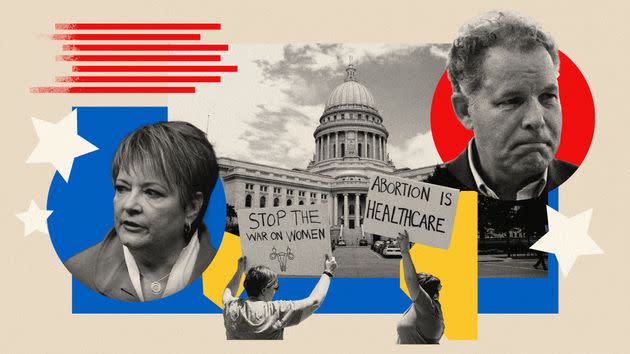
Judge Janet Protasiewicz, a liberal at left, is competing against former Justice Daniel Kelly, a conservative. Protasiewicz has spoken openly about her support for abortion rights and opposition to Republican gerrymandering.
MILWAUKEE ― Wisconsinites are set to elect a new justice to the state’s Supreme Court on Tuesday.
State Supreme Court races are often sleepy affairs, not least in Wisconsin, where they occur in the springtime ― months away from elections with greater turnout.
But this particular race has extraordinarily high stakes, eliciting an accordingly larger share of attention and resources.
The contest, prompted by the impending retirement of conservative Justice Patience Roggensack, will determine whether conservatives continue to hold a 4-3 majority on Wisconsin’s highest court, or if liberals hold the balance of power on the bench.
Wisconsin Democrats, who are all in for liberal Judge Janet Protasiewicz, see the chance to strike down a state-level abortion ban from 1849, undo Republican gerrymandering, and safeguard the battleground state’s election process ahead of the 2024 presidential and congressional elections.
Republicans rooting for conservative Daniel Kelly, a former state Supreme Court justice, believe they are locked in a similarly apocalyptic fight to prevent what they see as activist judges from overruling a host of bills passed by the state’s duly elected lawmakers.
A decade of conservative reforms hang in the balance, and the crown jewel of all of that is the maps because of the impact it could have.a Milwaukee-area Republican strategist
As a result, spending in the race has exceeded $45 million ― three times the previous national record in a judicial election. And it is by all accounts, a neck-and-neck race.
The combination of a “tipping point” election for control of the state Supreme Court and its relevance for “hot-button issues” like abortion rights and gerrymandering, “make this maybe the biggest Wisconsin Supreme Court race that we’ve ever had,” said Robert Yablon, a constitutional law professor at the University of Wisconsin, Madison.
In fact, because of the potential effect of the race’s outcome on gerrymandering and elections, the impact of Tuesday’s contest could extend far beyond Wisconsin’s borders. Specifically, how the Wisconsin Supreme Court adjudicates election law disputes could determine the outcome of the presidential election, and the fate of the state’s gerrymandered legislative and congressional maps could decide which party controls Congress.
“A decade of conservative reforms hang in the balance, and the crown jewel of all of that is the maps because of the impact it could have,” said a Milwaukee-area Republican strategist, who requested anonymity to protect professional relationships. “We could not only have the maps change and that could affect the legislature, but it could also flip the [U.S.] House [for Democrats].”
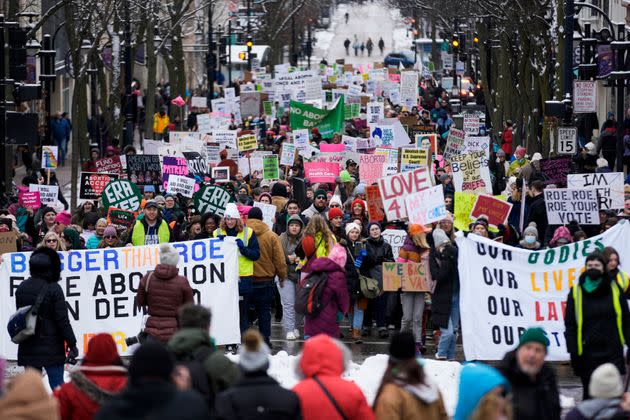
Protesters make their way to the Wisconsin Capitol Rotunda during a January march in support of overturning Wisconsin's near total ban on abortion.
Abortion On The Docket
It’s hard to believe now, but when Barack Obama won the presidency in 2008, he carried the state of Wisconsin by nearly 14 percentage points. At the time, the state had a Democratic governor and two Democratic U.S. senators; five out of its eight U.S. House members were Democrats.
Since then, Wisconsin has undergone one of the most remarkable rightward shifts in the country. When Republican Gov. Scott Walker won in 2010, he moved swiftly to gut the state’s labor unions ― a key source of Democratic donations and field power ― and ensure that the state’s new congressional and legislative maps favored the GOP. By the time Donald Trump narrowly won the Badger State in 2016, it was already a place where conservative politics had been ascendant for years.
Discontent with Trump among many Republicans and independents helped Democrats oust Walker in 2018 and flip the state for President Joe Biden in 2020. And in 2022, the backlash to the U.S. Supreme Court’s June decision striking down a federal right to abortion helped keep the governor’s mansion in Democratic hands.
But if the U.S. Supreme Court’s Dobbs opinion provided a momentary political jolt for Wisconsin Democrats, it also demonstrated the limits of the party’s recent gains.
Following the judicial ruling, an 1849 law criminalizing abortion took effect in Wisconsin, prompting doctors and clinics to stop offering the procedure in the state.
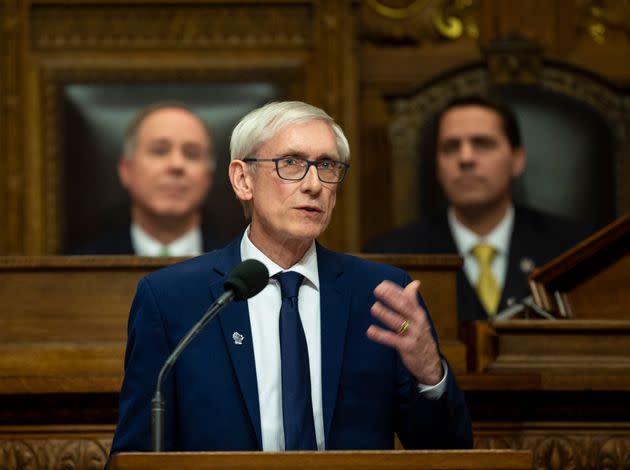
As Wisconsin Gov. Tony Evers (D) speaks in 2019, Republican state legislative leaders look on behind him. GOP leaders often refuse to engage with Evers' proposals.
Wisconsin’s antebellum abortion ban ― passed one year after Wisconsin became a state ― makes it a felony for anyone to perform an abortion, unless it is to save the mother’s life. There are no exceptions for rape or incest. People found guilty of violating the law can be punished by up to six years in prison and a $10,000 fine.
Wisconsin Republicans, who have large majorities in the state legislature, thwarted Democratic Gov. Tony Evers’ attempts to repeal the law or subject abortion policy to a referendum. The Republican legislature’s typical method for dispensing with the special legislative sessions that Evers convenes is to ceremonially gavel the session in, and gavel it to a close moments later without voting on any of Evers’ proposals.
Perhaps feeling the political heat for their opposition to abortion rights, Wisconsin Republicans have more recently tried to position themselves as amenable to compromise. In March, GOP lawmakers proposed legislation to create exceptions for rape and incest, and clarifying medical exemptions, but Evers has said he will not entertain proposals that fall short of the abortion rights guaranteed in the U.S. Supreme Court’s 1973 decision in Roe v. Wade.
Instead, Democrats hope to defeat the 1849 law in court. Immediately after the Dobbs decision, Wisconsin Attorney General Josh Kaul, a Democrat first elected in the same 2018 wave as Evers, filed a lawsuit to stop the 1849 law from being implemented. He argues that the law is unenforceable because, among other things, a 1985 Wisconsin barring abortion after fetal viability implicitly recognized a basic right to an abortion, and thus should supersede the old 1849 law.
Kaul’s lawsuit, filed against county prosecutors who might enforce the 1849 law, is still making its way through the lower courts, and is expected to eventually come before the Wisconsin Supreme Court.
That has made abortion rights ― and the fate of Kaul’s lawsuit ― the most important issue in the race to fill Roggensack’s seat.
But running as a pro-choice judicial candidate is trickier than it sounds. Wisconsin’s code of judicial conduct forbids judicial candidates from stating how they would rule in specific cases that might come before them.
So Protasiewicz, a Milwaukee County Circuit Court judge who previously worked as a prosecutor, has spoken about her “values” as a way of signaling to voters what they can expect from her tenure. Those values are a dominant theme in her TVads, which inform voters that Protasiewicz believes, “Women should have the freedom to make their own decisions on abortion.” She also has the support of major pro-choice groups like EMILY’s List and NARAL Pro-Choice America, though she has said that the endorsements were not the product of any promises she made to deliver a particular outcome.
“Any decision that I render will be made based solely on the law and the Constitution,” she said during her sole televised debate with Kelly on March 21.
Your values – whether you think there should be abortion rights or shouldn’t be abortion rights – have nothing to do with whether something is constitutional.Rick Esenberg, president of the Wisconsin Institute for Law and Liberty
But Kelly and his allies maintain that Protasiewicz’s discussions of her personal views reflect an attempt to interpret the law based on desired policy outcomes.
“Your values ― whether you think there should be abortion rights or shouldn’t be abortion rights ― have nothing to do with whether something is constitutional,” said Rick Esenberg, president of the Wisconsin Institute for Law and Liberty, a conservative nonprofit law firm.
For her part, Protasiewicz has pushed Kelly to answer for the endorsements he has received from anti-abortion groups like Pro-Life Wisconsin and Wisconsin Right to Life, which typically ask their candidates to commit to fighting for abortion restrictions.
“If he’s elected, I can tell you with 100% certainty: That abortion ban will stay on the books,” Protasiewicz told HuffPost in an interview at the Milwaukee offices of a campaign consultant.
Kelly, who was appointed to fill out the remainder of a state Supreme Court justice’s term in 2016 and lost his bid for a full term in 2020, has insisted that those groups’ pledges do not apply to judicial candidates.
“The conversations we had were this: ‘Will you pledge to follow them? Will you uphold the Constitution? Will you do the job of a justice and simply use existing law to decide the cases that come before the court?’” he said during the debate.
Charlie Sykes, an anti-Trump conservative based in the Milwaukee suburbs, isn’t buying it.
“He has spent the entire campaign making it absolutely clear how he would rule on everything,” Sykes said.
Indeed, last week, at an event hosted by former Milwaukee County Sheriff David Clarke, Kelly assured a conservative audience that they would “not have to worry” about how he would rule on a host of conservative priorities, such as gun rights, gerrymandering and voter ID laws.
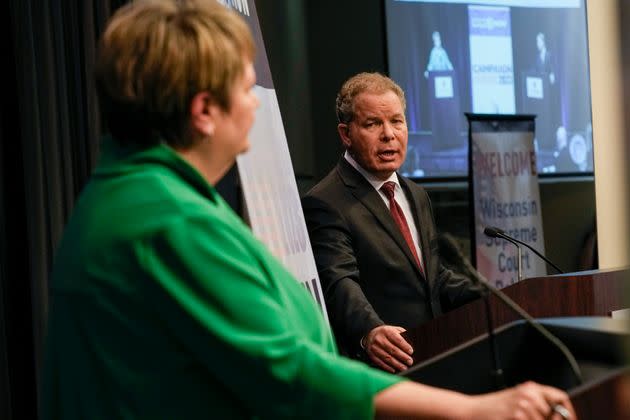
Daniel Kelly had a number of tense exchanges with Janet Protasiewicz during their sole televised debate. They both accuse one another of promoting judicial activism.
Attorney For The GOP With Ties To Election Deniers
The two candidates’ disagreement over abortion mirrors a larger fight over the extent to which either of them is a partisan judge.
Thanks in part to the $8 million she has received from the Democratic Party of Wisconsin, Protasiewicz has developed a massive fundraising advantage over Kelly, spending $13 million to his $2.4 million. The liberal billionaires George Soros, Illinois Gov. J.B. Pritzker (D), and Oklahoma couple Stacy and Lynn Schusterman, have each given the state party $1 million in the final weeks of the race.
Protasiewicz has promised to recuse herself from any case involving the Democratic Party of Wisconsin, though conservatives argue that she would have to deal with liberal groups closely aligned with the state party.
And while Kelly is receiving less direct help from the Republican Party, he is receiving major, partisan conservative support through other means.
For one thing, Kelly has welcomed the Republican Party of Wisconsin’s mobilization of voters on his behalf, which counts as an in-kind contribution. And an array of conservative outside groups backing Kelly have helped offset Protasiewicz’s direct fundraising edge with multimillion-dollar advertising blitzes of their own. The Wisconsin Manufacturers & Commerce Issues Mobilization Council, a big business umbrella group, has spent $5.8 million in support of Kelly ― and Fair Courts America, a group bankrolled by billionaire Republican mega-donor Dick Uihlein of Illinois, has spent another $5.2 million on his behalf.
Don’t you think there should be a Supreme Court justice who isn’t going to vote to overturn the 2024 election results if they don’t come out the way that he wants?Judge Janet Protasiewicz, liberal candidate for Wisconsin Supreme Court
Kelly, however, has taken the most heat for his work advising the Republican Party of Wisconsin on election issues before and after the 2020 presidential election. The former chairman of the state GOP told the congressional committee investigating the Jan. 6, 2021, riot at the U.S. Capitol that he had consulted Kelly about plans to ready an alternate slate of electors that would have effectively flipped the state’s votes to Trump. Kelly has said repeatedly that he was asked only if he was apprised of the so-called fake electors scheme, and he told the party leader that he was not.
Protasiewicz does not believe him. She is seizing on Kelly’s participation in the state and national Republican parties’ “election integrity” events ahead of the 2022 midterm elections as evidence of his sympathy for election deniers, and a complicated instance in which he “un-recused” himself from an election law case that ended up involving campaign donors as evidence of his “corruption.” Kelly has also declined to promise that he would recuse himself from cases involving the Republican Party of Wisconsin, opting instead for a case-by-case approach to recusals.
What’s more, in late March, Kelly appeared with Scott Presler, a right-wing activist who attended the “Stop the Steal” rally on Jan. 6, 2021, that gave way to the U.S. Capitol riot, calling the rally “largest civil rights protest in American history.” Kelly has said he is “not really familiar with [Presler’s] background” regarding Jan. 6, but called Presler’s organizing in Wisconsin “invaluable.”
“Don’t you think our elections should be fair and free? Don’t you think there should be a Supreme Court justice who isn’t going to vote to overturn the 2024 election results if they don’t come out the way that he wants?” Protasiewicz told HuffPost. “That’s what I think will happen” if Kelly wins.
The judicial campaign has clearly taken a personal toll on Protasiewicz, who said she was leading a comfortable life as a local judge before deciding to run. When HuffPost met with her, she had just hired a private security team to trail her due to the growing number of nasty, threatening phone calls and written messages she had been receiving from angry conservatives.
But Protasiewicz maintains that she would not be running if she did not believe that democracy was on the line.
“It’s not all about me,” she said of her decision to run. “This is really about our state. That’s why I’m doing it.”
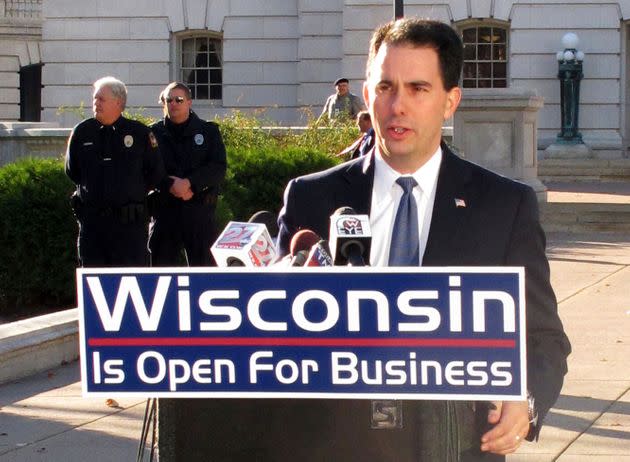
Former Wisconsin Gov. Scott Walker (R), seen here in 2010, transformed Wisconsin politics, not least by drafting legislative and congressional maps favorable to the GOP.
‘Asking For A Fair Shake’
“Democracy” is also often the word on Wisconsin Democrats’ lips when it comes to the critical issue of gerrymandering.
To Protasiewicz and many Democrats, the impact of Republican gerrymandering in the state legislature is obvious. Wisconsin is a closely split state in which Democrats regularly win statewide office, but Republicans still have a nearly two-thirds majority in both state legislative chambers. In 2016, a Stanford University political scientist and statistician found that the 2011 map, upon which the current maps are closely based, was a stronger Republican gerrymander than all but four maps drawn anywhere in the United States between 1972 and 2014.
“I don’t feel as though I’m going out on any legal limb when I say that the maps are unfair ― bottom line,” Protasiewicz told HuffPost.
Kelly, who represented Republican state lawmakers when they were defending their gerrymandered 2011 maps in court, maintains that it’s not the job of the state Supreme Court to determine whether the maps are “fair” or not. Instead, he argues that the redistricting process is fundamentally political in nature, and that the court is tasked solely with determining whether maps adhere to the state constitution’s legal requirements that each district be contiguous, contain an equal number of people, be as compact as “practicable,” and comply with the federal Voting Rights Act.
“You address the legal questions that relate to the map, but leave the political questions to the legislature where they belong,” he said during the debate.
Wisconsin’s new state legislative and congressional maps have already been heavily adjudicated in the state Supreme Court ― and should a new ideological balance take hold on the court, it is likely they will be once again.
By November 2021, Evers and Republican lawmakers had reached an impasse on adoption of new maps, sending the issue to the courts. The conservative majority on the state Supreme Court subsequently ruled that it would not pick a map based on partisan “fairness,” and would instead prioritize maps with the “least changes” from the 2011 maps that had been enacted by the democratically elected legislature.
After a legal back-and-forth in which the state Supreme Court temporarily ruled in Evers’ favor in March 2022, the U.S. Supreme Court overturned the state court’s selection of Evers’ state legislative maps, while allowing his congressional maps to stand. The conservative majority in the U.S. Supreme Court ruled that the Wisconsin Supreme Court had not adequately considered whether Back voters’ right to political representation might be accommodated without the seventh majority-Black Assembly district that Evers had included in his proposal.
Instructed to pick a map using narrower parameters, the conservative majority on the state Supreme Court adopted GOP state legislators’ redistricting proposal.
There’s no way that a fairer map involves it being gerrymandered to hell and back for Democrats.Joe Zepecki, a Milwaukee-area Democratic strategist
Protasiewicz has said she feels comfortable associating herself with the dissenting liberal opinion in that ruling, since the state Supreme Court has already weighed in on the matter. In that dissent, Justice Jill Karofsky, who defeated Kelly in 2020, argues that the conservative justices had failed to consider how the state legislature’s map engaged in a “racially motivated” effort to pack more Black voters into fewer districts in a way that violated Black voters’ constitutional rights.
Should Protasiewicz win, forging a liberal majority on the Wisconsin Supreme Court, it’s likely that the court would consider entirely different standards for what kinds of redistricting is permissible. While Evers’ congressional map became law, he drew it under court orders to draft a map with the “least changes” relative to the heavily gerrymandered 2011 map.
A liberal majority on the high court could open the door to congressional maps with more competitive seats than the present map, where Republicans currently hold six out of the state’s eight U.S. House seats. Given the precariousness of the Republican majority in the U.S. House, where the GOP has a nine-seat edge over Democrats, it could contribute to a Democratic takeover of the chamber.
“There’s no way that a fairer map involves it being gerrymandered to hell and back for Democrats,” said Joe Zepecki, a Milwaukee-area Democratic strategist. “There will be more competitive districts.”
In addition, more competitive House seats could in turn drive up Democratic turnout in the statewide elections in 2024. That could help Biden win the state for a second time, as well as bolster Democratic Sen. Tammy Baldwin’s bid for a third term in office.
Accounting for all of those factors, the outcome of the judicial race “will have a massive impact for 2024,” the Milwaukee-area Republican strategist told HuffPost.
Democrats have also long lamented the impact of the state’s numerous voter ID laws and ballot restrictions on the rights of marginalized groups.
Many of those laws have survived liberal challenges thanks to the conservative state Supreme Court majority. Ahead of the 2022 elections, for example, the state Supreme Court upheld the legislature’s prohibitions on voters using drop-boxes to vote or delegating someone else to submit their ballot for them. Disability rights advocates maintain that these new restrictions create burdensome obstacles for voters with disabilities who relied on surrogates and drop-boxes.
In fact, thanks to those changes and other restrictions adopted after the 2016 election, Wisconsin is now the fourth most difficult state in the country in which to vote, according to a Cost of Voting Index compiled by a group of academic researchers.
“Republicans have conspired for years to rig Wisconsin’s electoral laws to depress turnout in Milwaukee specifically,” said Ben Wikler, chair of the Democratic Party of Wisconsin.
Should a more liberal Wisconsin Supreme Court reconsider existing voting restrictions, both major parties believe it could redound to Democrats’ advantage, albeit less significantly than new maps.
“Democrats have pretty much tipped their hand that they see this as a policy-making opportunity,” Ben Voelkel, a spokesperson for Kelly’s campaign, told HuffPost. “That’s a complete misattribution of the role of the judiciary.”
Wisconsin Democrats maintain, however, that any electoral benefits they reap would be a byproduct of fairer and less doctrinaire judicial rulings, rather than an end in itself.
“We’re just asking for a fair shake ― an independent court that looks at the rule of law,” Wikler said.
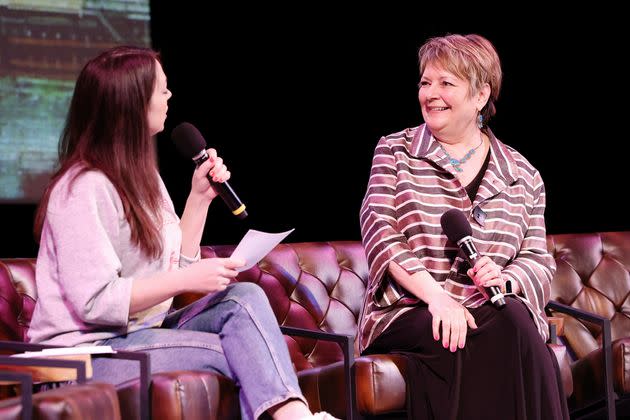
Protasiewicz (right) speaks during a live taping of the liberal podcast, "Pod Save America," in Madison, Wisconsin, on March 18. National groups have converged on the state ahead of Tuesday's election.
Scramble For The Suburbs
Like so many midwestern “swing” states, Wisconsin has undergone a partisan realignment in the past decade. Rural, working-class areas where Democrats were competitive for decades prior to 2010 have trended steadily Republican. And in the wake of Trump’s election and the Supreme Court’s Dobbs decision, many historically Republican suburban communities around Milwaukee have shifted substantially toward Democrats.
Since wealthier and more educated residents tend to vote more frequently, those voters’ movement toward Democrats appears to have improved the party’s performance in Wisconsin’s low-turnout springtime elections.
In addition, the Madison metropolitan area, which is both very liberal and highly educated, has grown dramatically in size in recent years.
“The sheer shape of what happens in spring elections has really evolved as the coalitions have changed within right versus left,” Zepecki said.
As a result, statewide Democratic candidates, or liberal Supreme Court contenders backed by Democrats, have won four out of the five last springtime elections.
The $45-million question is whether the issues of abortion rights, election denial, and more competitive legislative maps remain salient enough in the minds of both Democratic base voters, and persuadable moderates ― especially women ― to replicate the party’s winning formula in Tuesday’s race.
If abortion remains as dominant an issue as it was in November, Protasiewicz is in a “very, very strong position,” Sykes predicted.
HuffPost encountered some evidence that the issues of abortion rights and election fairness were motivating infrequent Democratic voters to turn out.
Colleen Kuesel, a marketing professional who lives in the Milwaukee suburb of Mequon, consistently votes for Democrats, but this is the first springtime election in which she is participating.
Democrats have pretty much tipped their hand that they see this as a policy-making opportunity.Ben Voelkel, a spokesperson for Kelly’s campaign
Asked why, she replied, “The crazies that are running.”
Who did she have in mind?
“Daniel Kelly, who’s running for Supreme Court here, is a Trumper and supported the Jan. 6 events and is against abortion,” said Kuesel, who voted for Protasiewicz.
Perhaps sensing that a fight over abortion policy is not likely to end well for Kelly, the conservative candidate and his allies have sought to shift attention to the issue of crime. Kelly and groups backing him have run a steady stream of TV ads depicting Protasiewicz as soft on crime, including one spot that deliberately emulates the then-presidential candidate George H.W. Bush’s infamous Willie Horton ad in 1988.
Protasiewicz insists that the attacks cherry-pick cases and obscure crucial context. “Every single case you look at the serious nature of the crime, the need to protect the public, and the character of the defendant,” she said during the debate with Kelly. “That is what I evaluated in each and every case.”
Protasiewicz has even gotten some vindication for her claims that the attacks on her criminal justice record are dishonest. For example, two recent spots aired by the pro-Kelly groups Wisconsin Manufacturers & Commerce and Fair Courts America, respectively, blast Protasiewicz for sentencing a rapist to 2 1/2 years of prison and 2 1/2 years of community service.
But the woman who survived the rape objected to the ads, saying that they were re-traumatizing her and that they failed to note her support for the sentence. TV stations subsequently took the advertisements down at the behest of the Protasiewicz campaign, which threatened legal action on the grounds that the ads were “defamatory.”
When speaking to his base, Kelly and his allies have also warned that a win for Protasiewicz could endanger more than a decade’s worth of conservative legislation, including the state’s strict voter ID laws, permissive gun laws, and Act 10, former Gov. Walker’s bill restricting public-sector unions’ collective bargaining power.
Don Waldvogel, a retired salesman in the Milwaukee suburb of Menomonee Falls, is a staunch Republican and an avid listener to influential conservative talk radio host Dan O’Donnell.
Waldvogel said he was “kind of halfway” on abortion rights, because he is “not totally opposed” to the practice being legal, but he is concerned about Act 10 and other bills being overturned.
“I just don’t like to see things overturned by the Supreme Court in the ‘woke’ way,” he concluded.
